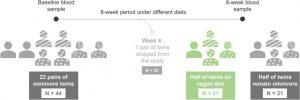The Twins Nutrition Study (TwiNS) recently provided ground-breaking insights into how different diets, specifically vegan and omnivorous, impact biological aging. Using epigenetic markers, the study assessed the DNA methylation patterns of twins who followed either a vegan or omnivorous diet over an 8-week period. Epigenetic clocks, which predict biological age based on DNA methylation, were utilized to measure the rate of aging.
Further Reading: Impacts of diet choice on your immune system
The results of the study were striking. The twins who adhered to a vegan diet exhibited significant reductions in epigenetic age acceleration compared to those following an omnivorous diet. This reduction was particularly evident in markers related to inflammation and metabolic health, which are closely associated with the aging process. The vegan diet’s anti-aging effects are attributed to its high content of fruits, vegetables, and whole grains, which are rich in antioxidants and anti-inflammatory compounds.

Figure: Timeline diagram for the study design. A total of 21 pairs of twins (N=42) were subjected to a vegan diet (N = 21, labeled in green) and an omnivore diet (N = 21, labeled in orange). Blood was collected for baseline at the start of the trial (week 0) and at the end of the trial (week 8) and methylation states were quantified using the EPIC 850k array
However, the study also highlighted the need for careful nutrient management in vegan diets. Nutrients such as vitamin B12, omega-3 fatty acids, and vitamin D, which are typically found in animal products, were identified as essential for optimal epigenetic health. Without proper supplementation, individuals following a vegan diet may be at risk of nutrient deficiencies that could offset the benefits of plant-based eating.
The study’s findings have important implications for the field of geroscience, which seeks to understand and mitigate the biological mechanisms of aging. The vegan diet’s positive impact on epigenetic aging suggests that plant-based nutrition could be a viable strategy for promoting healthy aging. However, long-term studies are needed to confirm these benefits and explore the potential risks of nutrient deficiencies in vegan diets.
In conclusion, the Twins Nutrition Study provides compelling evidence that vegan diets can positively influence the epigenetic markers of aging. This research underscores the importance of dietary quality and nutrient supplementation in maintaining health and longevity.
Summary by Faith Oluwamakinde










